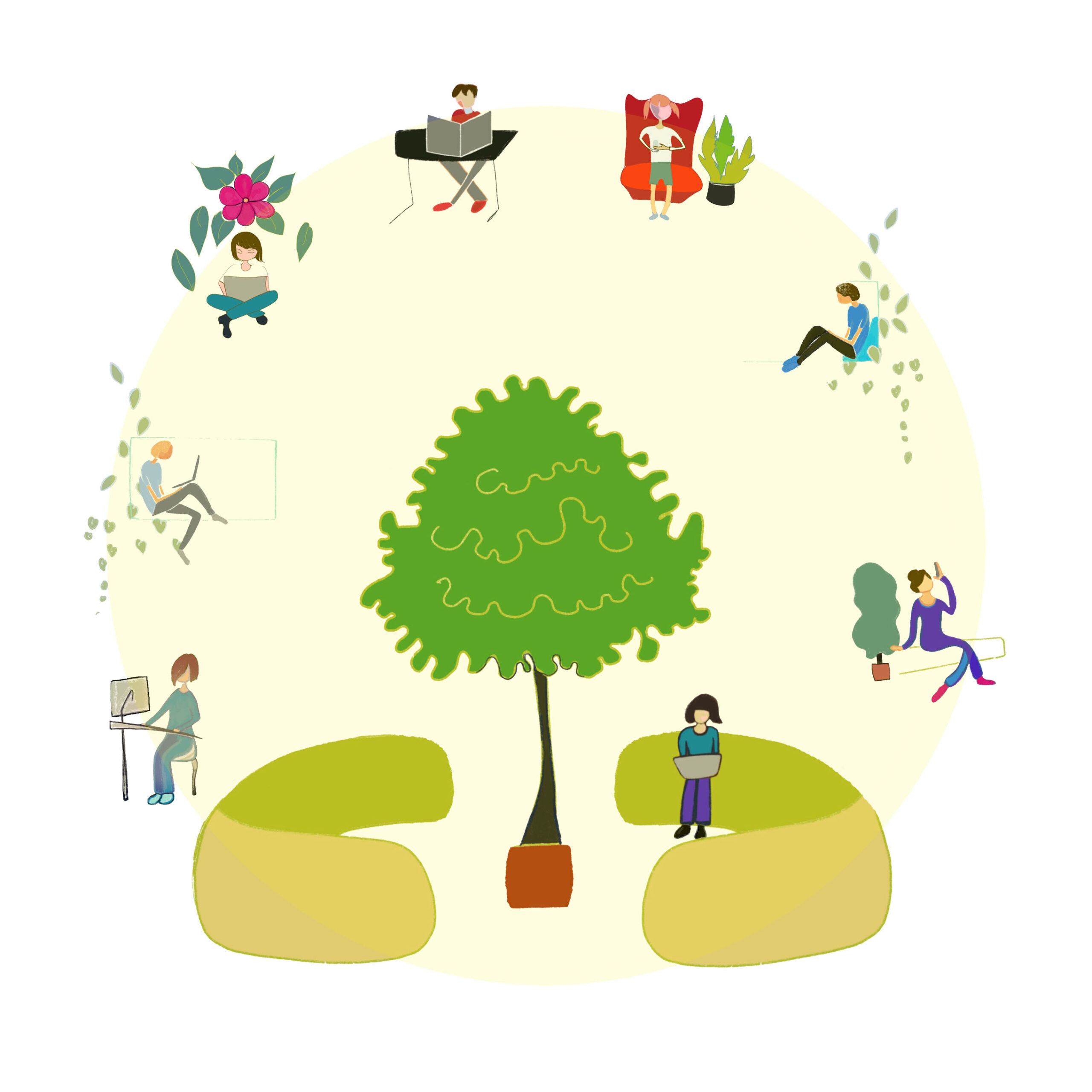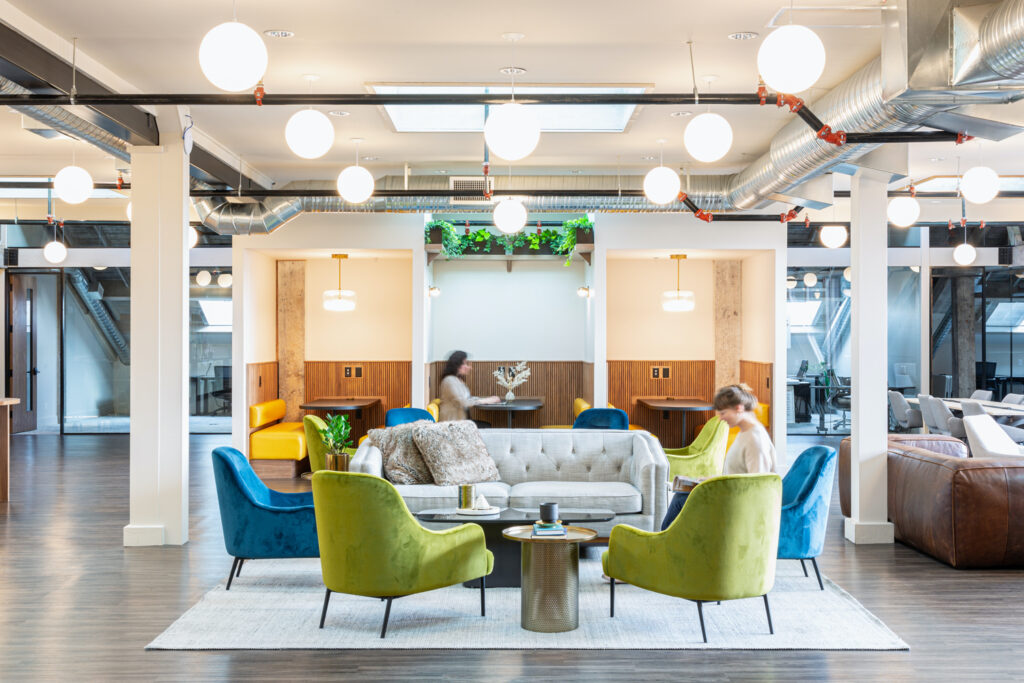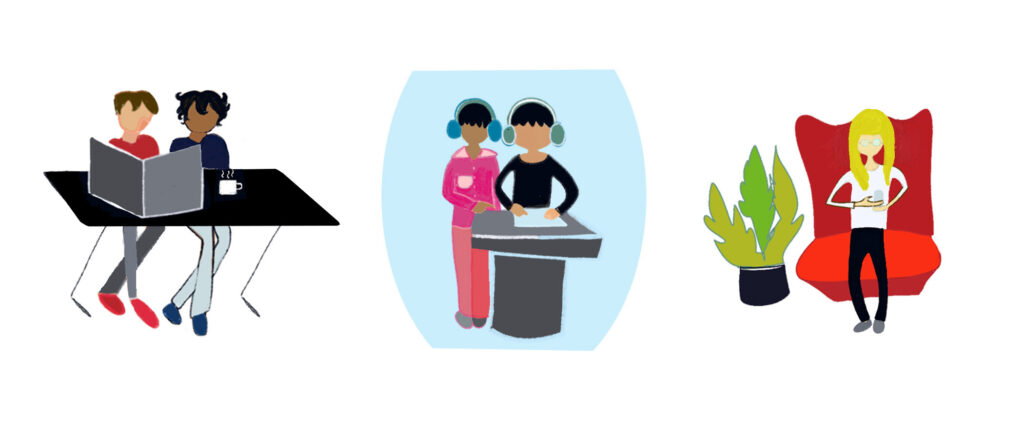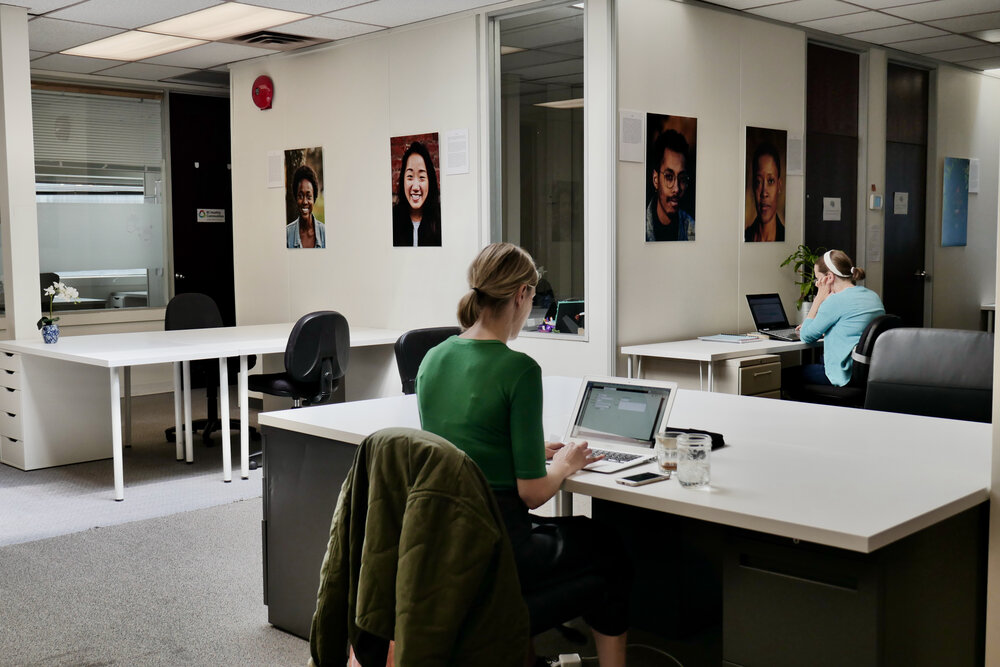Coworking Capital
Forging Community Bonds in the Work-From-Home Era at KWENCH and theDock

Words by victoriA sztanek / illustrAtions by freyja zAzu
You’ll likely spend 2,080 hours at work this year. But you’ll also face an unfamiliar choice: where are you going to spend them?
If you reside in Canada there’s a 25% chance that you’re currently able to work from home, either on a permanent or temporary basis. But while WFH was once viewed as the ultimate luxury, the realities have been far less glamorous.
Let’s face it, most of our homes’ interiors don’t exactly inspire us to achieve great things. And for those with families or roommates, lockdown very quickly revealed the importance of separating our workspaces from the places where we attempt to relax – and how combining them completely undermines any effort to de-stress or unwind.
Historically, the café was adopted as a temple of respite for the transient worker, but these too come with inconveniences: they’re unpredictably crowded, come with a permanently too-loud-for-Zoom background soundtrack, and charger plug-ins are more scarce than downtown parking spots.
So for those of us who have abandoned the cubicle – whether by choice or mandate – where lies our new Worktopia?

Originally, and now infamously, that call was answered by WeWork, all the way back in 2010. And while we’re certainly not singing the praises of that scandal-laden organization’s culture or business practices, they were certainly onto something when they set out on their mission to reinvent work – a full decade before our lives were upended by a global malady.
The result was a company valuation of tens-of-billions-of-dollars at one point, and while the model became unstable for a number of sketchy reasons, there’s no denying that the cause at its heart resonated deeply with an increasingly fugitive workforce.
Even in that pre-pandemic landscape, digital culture was (albeit slowly) changing the nature of work. ‘Digital nomad’ became the Instagram bio of choice for upstart millennials as the tech bubble slowly began to re-inflate. If you believed the images posted to social media timelines, cubicle life had been effortlessly replaced by a wifi-enabled cabana on a sunny shoreline in Central America. But, for a variety of quite grown-up reasons, that massive lifestyle upheaval simply wasn’t viable.
“The majority of meandering freelancers, startup hustlers, and other assorted creative malcontents weren’t able to leave their families and cohorts, sublet their living spaces, and withdraw a few bazillion pesos – but we still needed a place to do our work.”
So the popularity of the coworking space flourished. It was an antidote to the bland seclusion of our uninspired apartment living rooms, or our trapline of inconvenient cafés. And it was no longer only the realm of the self-employed individual: the ‘hot desk’ coworking model gave an incentive to an organization’s owner or leader to abandon the mundane cubicle scene, downsize their leased floorspace to zero, and massively reduce their business overheads.
And then, like everything prefixed with ‘co-’, it all abruptly halted in 2020. But now, with the roar of the pandemic dulling into the recesses of our consciousness (for better or worse) things seem to have settled into a rhythm. (“Seem” to, because who knows what’s around the corner…)
The reported benefits of coworking spaces are myriad. On top of raising personal morale and strengthening community, they’ve also been shown to jumpstart productivity. One survey showed 46% of respondents improved their output. As people show up daily, their work and personal lives naturally converge.
By becoming a part of the community, you’re just as likely to get a work referral as you are an invitation to happy hour drinks.

"Coworking spaces are so much more than an office: they’re a dynamic network of people supporting one another to varying degrees and depths — in what feels like a more modern take on the traditional community center."
In a Pacific Northwest city like Victoria, where seasonal depression’s wrath can descend with a vengeance every year, a coworking membership might be the thing you need to feel more engaged, spur inspiration, and simply get shit done – all while feeling just a little bit happier throughout the darker months.
For the ‘coworking curious’ in Victoria, there’s good news: you have multiple options right inside the downtown core. theDock and KWENCH are two such spaces, with distinct, but not opposing, coworking cultures.
theDock, a self-proclaimed social impact hub, attracts individuals and organizations who work to make Victoria (and the world) a better place. The friendly and inviting space brings together an array of academics, community health organizations, environmental researchers, Green party politicians, and even technical HVAC workers that reduce carbon footprint.
Underscored by a desire to decolonize and create an inclusive space, theDock is a community of changemakers, genuinely compassionate citizens, and social entrepreneurs. And if, like me, you need a refresher on the definition of “social entrepreneur,” here’s the dictionary definition: “a person who establishes an enterprise with the aim of solving social problems or effecting social change.”
theDock’s walls are adorned with a rotating exhibition of paintings from local artists as part of their partnership with the Victoria Arts Council. It is, by design, a supportive place for socially conscious citizens to gather and do meaningful work. Bringing these people together forms theDock’s cultural foundation — one built on trust and camaraderie, allowing coworkers to show up with a shared ambition, and lend their support to one another’s causes.
Members can partake in after-work or lunchtime social events, including a weekly salad potluck. As theDock’s Community Manager, Colin Richards, says, “Our biggest job as staff is to connect with people, and connect them with other people.” Ultimately, the success of any coworking space relies on the community it attracts and cultivates, “You need to have great people that are empathetic and willing to connect.”
Undoubtedly, the last couple of years has strengthened the coworking industry — accelerating it from a small niche to a ballooning business. And with several coworking spaces in close proximity (and all of them bustling), the general sentiment is that they’re good for Victoria.
Motivating, imaginative, and community-focused, “the more people we can bring into this more hopeful (coworking) world, the better,” says Colin.

Just an 11-minute walk away sits KWENCH — a beautiful and popular self-described “lifestyle club”. Born of a desire to facilitate happier working lives while enabling greater convenience for its members, KWENCH offers in-house fitness lessons, meditation classes, workshops, and more. Fittingly, KWENCH is an acronym for knowledge, wellness, experiences, novelty, curiosity, and connection — in support of health and happiness.
Comfortable, spacious, and objectively beautiful, Kwench’s facilities include a meditation room, a licensed bar, and private “phone booths” for calls or laptop-driven meetings. It’s a place you can easily spend your day, with gentle lighting and smiling, helpful staff members.
Founder Tessa McLoughlin describes KWENCH as part of “the third wave of coworking,” as it’s more hospitality-focused than a mere shared rental space for work. Strolling down its modern hallways, KWENCH’s micro-offices, thoughtful nooks, and reservable boardrooms are really a microcosm of Victoria’s vibrant culture. They accommodate and incubate diverse industries: cryptocurrency, psilocybin, cybersecurity, packaged goods, marketing, and more.
These spaces provide a gateway into Victoria’s local culture. While pouring your kombucha on tap, imagine striking up a conversation with a neurophysicist or a psychedelic researcher. Or chatting with someone about their documentary screening over coffee. People are doing really cool, impactful work in this city that most of us have never even heard about. But that’s the magic of coworking: eye-opening and perspective-shifting interactions, that strengthen your network and create unseen opportunities. And they could be as close as the next communal workstation.
Walking around both The Dock and KWENCH, you can easily see all the varied pockets of people nurtured here — either brought together by ideological underpinnings, entrepreneurial ambitions, or a combination of the two.

For Victoria, a city sometimes coloured with hues of anti-capitalism, supporting local business is ironically paramount. As Tessa pointedly notes, “Small businesses are culture. When you walk down Johnson Street, do you want to be surrounded by Urban Outfitters, H&M, and Forever 21? It’s the little, individual businesses that make Victoria.”
Coworking spaces – and the changemakers within – are essential to Victoria’s cultural tapestry. KWENCH’s stylishly collaborative esprit, and theDock’s socially driven mandate, provide hubs for creativity, innovation, and the connections that define our local identity. They’re filled with people doing the hard, visionary work that makes Victoria what it is. Together.

